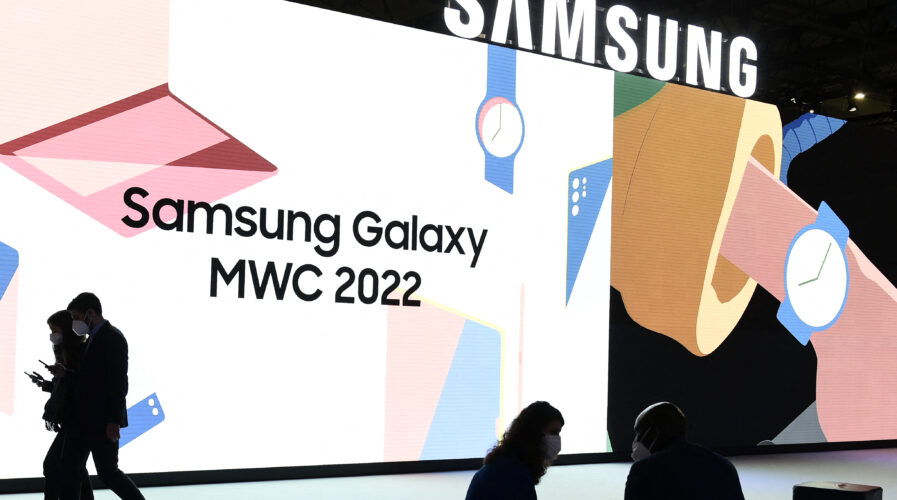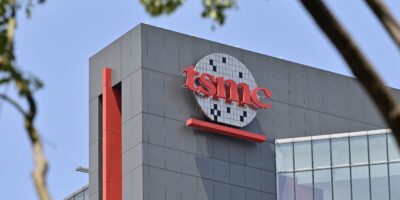
Solid demand for memory chips pushed Samsung to its best Q1 profit in four years. (Photo by Josep LAGO / AFP)
Samsung’s profit soars thanks to solid demand for memory chips
- The South Korean tech giant’s operating profit jumped 50.3% in the first quarter from a year earlier.
- The stellar preliminary earnings are mainly attributed to robust demand for new smartphone models and memory chips that go into servers.
- Full earnings are due to be released later this month.
Samsung Electronics Co, the world’s largest smartphone and memory chip maker, once again topped analysts’ estimates by recording its highest quarterly profits in four years. Underscoring the global appetite for memory chips and its new smartphone models, Samsung’s operating profit increased by a staggering 50% to 14.1 trillion won (US$11.6 billion) for the three months ended March this year.
According to the South Korean giant’s earnings guidance, revenue is seen touching 77 trillion won, which would represent an increase of 17.8% from the year before. Samsung is expected to release full earnings figures and hold an investors’ call later this month. At this point, the number’s released proves that Samsung is half way there in beating expectations mainly backed by solid demand for memory chips.
Citigroup’s analyst Peter Lee, in a note ahead of the results said, “We expect solid earnings growth in 2022 on the back of healthy earnings rebound in semiconductors and display in 2H 2022. Specifically, we expect Samsung’s memory business to benefit from the memory pricing strength throughout 2H 2022.”
Separately, IBK Investment & Securities analyst Kim Un-ho in a report reckon that “price decline in memory chips will be contained on the back of stronger than expected demand.” Despite memory chip prices dipping in the first quarter, analysts said solid demand from data center clients as well as cautious investment spending by chipmakers and limited capacity expansion buoyed Samsung’s chip earnings, which make up about half of its total profits.
Some even reckon that the South Korean giant has also likely benefited from a disruption at a rival NAND Flash chip plant owned by Japan’s Kioxia and American firm Western Digital. Going forward, Kim forecast the conglomerate would make 60.5 trillion won in operating profits for 2022 overall, a 17% increase year-on-year.
Earnings of the tech giant were also supported by brisk smartphone sales in the quarter, another of Samsung’s growth pillars. In fact, Citigroup estimates cumulative sales of the Galaxy S22 series will likely exceed one million units in South Korea by this week. The new flagship lineup, which made its debut in February, is selling at a 20% faster clip than the previous S21 series, Lee noted.
To top it off, according to research firm Counterpoint, in the US, the S22 sold 60% more than the S21 in its first three weeks on the market. Overall, experts reckon that the results announcement among tech giants for the first quarter this year, might be impacted considering it is a period disrupted by war in Ukraine, sanctions on Russia and resurgent Covid-19 infections in China.
Samsung is considered an industry bellwether because it is both a major electronics maker and components supplier to the world’s biggest tech firms, including Apple Inc. and Sony Group Corp. Because of the pandemic shifts, demand for personal computers, data servers and mobile devices, which all require memory chips, have been steadily increasing. As a result, memory chip makers recorded growth in shipments and enjoyed greater pricing power.
Samsung has also been aggressively stepping up investment in its semiconductor business as the world battles chip shortages that have hit everything from cars and home appliances to smartphones and gaming consoles. In November, it announced a new microchip factory in Texas, a US$17 billion investment.
The plant is expected to be operational by the end of 2024. The firm is also investing in the development of advanced technologies such as artificial intelligence, robotics and 5G/6G communications.
READ MORE
- Ethical AI: The renewed importance of safeguarding data and customer privacy in Generative AI applications
- How Japan balances AI-driven opportunities with cybersecurity needs
- Deploying SASE: Benchmarking your approach
- Insurance everywhere all at once: the digital transformation of the APAC insurance industry
- Google parent Alphabet eyes HubSpot: A potential acquisition shaping the future of CRM


